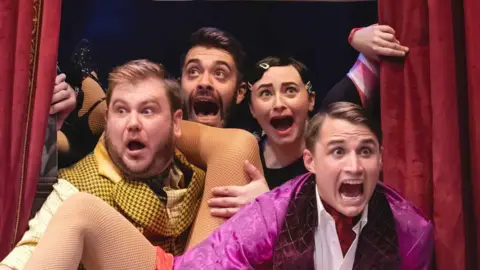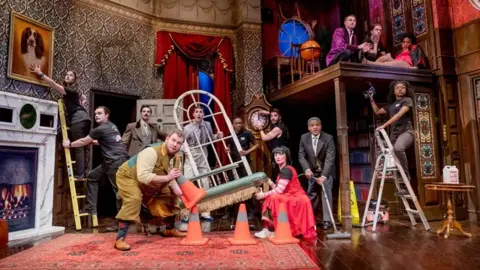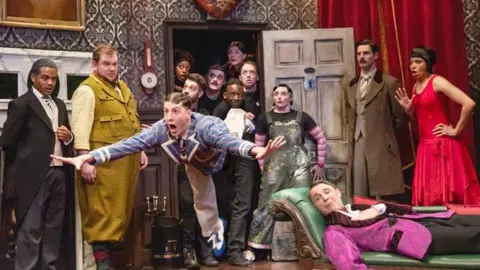 Matt Crockett
Matt Crockett The co-writer of a popular comedy has said he is “so thrilled” to be celebrating its 10 years in the West End.
Henry Lewis, 35, who grew up in Buckinghamshire, wrote The Play That Goes Wrong, with Jonathan Sayer and Henry Shields almost straight after drama school.
The show about accident-prone thespians – where everything that can possibly go wrong, does – has also been licensed to be performed in more than 50 countries.
“It continues to surprise us,” Lewis said.
 Jennifer Katzman
Jennifer KatzmanThe show follows a university drama company trying to put on a 1920s Agatha Christie murder mystery in which the actors and crew battle to make it through to the curtain call.
Its three writers met at the London Academy of Music and Dramatic Art and first started working on the play in 2012.
It opened at the Duchess Theatre in September 2014 where it has been performed more than 3,500 times with 106 actors and won 11 awards including an Olivier, a Tony and a Moliére.
Lewis’s time at Amersham and Wycombe College and in youth theatre in High Wycombe provided experiences of things going wrong which fed into the show. The writers also formed an improvisation troupe at college which was “kind of good grounding for it too,” he said.
 Danny Kaan
Danny KaanIt was first performed at The Old Red Lion, a 60-seat fringe theatre in Islington, London, with the writers not thinking it would go much further.
“We thought that it would maybe have a little bit of a future because people did seem to enjoy it but we never really thought it would go into the West End so to be celebrating ten years [there] is mad,” Lewis said.
During subsequent runs at the Edinburgh Festival and a national tour the writers “tweaked it and tidied it up”, Lewis said, so that by the time they got to the West End they had something that was “really kind of finely tuned”.
“The show begins as soon as you walk into the theatre,” Lewis said, “the stage manager is looking for a missing dog, and the director is walking round greeting the audience so straight away you’re immersed in the world of the Cornley University Drama Society.
“There’s farce, there’s lots of slapstick, lots of big visual jokes, it’s a really, really laugh out loud, fun couple of hours.”
 Matt Crockett
Matt CrockettSometimes things really do go wrong, but because that is the premise of the show, it usually goes unnoticed.
Lewis recalled a time when a cast member dislocated his shoulder and they had to stop the show.
“What was funny about it was that people didn’t realise that it really had gone wrong,”he said.
“People were coming up to us during the break and saying ‘Oh, that’s very, very funny’ when we were trying to get him out of the theatre and into an ambulance.
“They thought it was all part of it, that we’d hired a fake ambulance and when the understudy came on and it was a different person everyone thought that [was supposed to happen] as well.
“So often when something does go wrong people either think that it’s part of it or don’t notice… the play just kind of continues so in that sense the mistakes can be almost invisible.”
 Matt Crockett
Matt CrockettLewis thinks the play’s longevity can be attributed to it being “really, really funny” and appealing to all the age groups.
“People need a laugh and a kind of release and escape,” he said.
“But it’s also fairly universal in its humour and that’s why it’s done well overseas.
“I think there’s something fairly universal about performing and things not quite going to plan and them making them worse by trying to come up with a solution in the moment – I think everyone has kind of been there,” he said.



